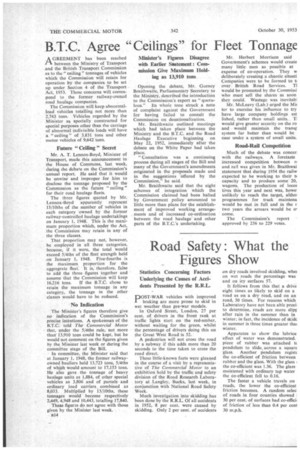B.T.C. Agree "Ceilings" for Fleet Tonnage
Page 48

If you've noticed an error in this article please click here to report it so we can fix it.
Minister's Figures Disagree with Earlier Statement: Commission Give Maximum Holding as 13,910 tons AGREEAGREEMENT has been reached MENT the Ministry of Transport and the British Transport Commission as to the " ceiling" tonnages of vehicles which the Commission will retain for operation by the companies to be set up under Section 4 of the Transport Act, 1951. These concerns will correspond to the former railway-owned road haulage companies.
The Commission will keep abnormalload vehicles totalling not more than 2,743 tons. Vehicles regarded by the Minister as specially constructed for special purposes other than the carriage of abnormal indivisible loads will have a " ceiling" of 3,831 tons and other motor vehicles of 9,642 tons.
Future "Ceiling" Secret
Mr. A. T. Lennox-Boyd, Minister of Transport, made this announcement in the House of Commons, last week, during the debate on the Commission's annual report. He said that it would be unwise and improper for him to disclose the tonnage proposed by the Commission as the future " ceiling " for their road haulage fleets.
The three figures quoted by Mr. Lennox-Boyd apparently represent 13/10ths of the number of vehicles in each category -owned by the former railway-controlled haulage undertakings on January 1, 1948. This is the maximum proportion which, under the Act, the Commission may retain in any of the three classes.
That proportion may not, however, be employed in all three categories, because, if it were, the total would exceed 5/4ths of the fleet strength held on January 1, 1948. Five-fourths is the Maximum proportion for the aggregrate fleet. It is, therefore, false to add the three figures together and assume that the Commission will keep 16,216 tons. If the B.T.C. chose to retain the maximum tonnage in any category, the tonnage in the other classes would have to be reduced.
No Indication The Minister's figures therefore give no indication of the Commission's precise intentions. A spokesman of the B.T.C.' told The Commercial Motor that, under the 5/4ths rule, not more than' 13,910 tons could be kept, but he would not comment on the figures given by the Minister last week or during the committee stage of the Bill.
In committee. the Minister said that at January 1, 1948, the former railwayowned hauliers held 13,723 tons, 5/4ths of which would amount to 17,153 tons. He also gave the tonnage of heavy haulage units as 1,884, of other special vehicles as 3,806 and of parcels and ordinary load carriers combined as 8,033. Multiplied by 13/10ths, these tonnages would become respectively 2,449, 4,948 and 10,443, totalling 17,840.
These figures do not agree with those given by the Minister last week.
al4 Opening the debate, Mr. Gurney Braithwaite, Parliamentary Secretary to the Ministry, described the introduction to the Commission's report as "querulous" Its whole tone struck a note of complaint against the Government for having failed to consult the Commission on denationalization.
Mr. Braithwaite outlined meetings which had taken place between the Ministry, and the B.T.C. and the Road Haulage Executive beginning on May 22, 1952, immediately after the debate on the White Paper had taken place.
"Consultation was a continuing process during all stages of the Bill and many of the Government's amendments originated in the proposals made and in the suggestions -offered by the Commission," he said.
Mr. Braithwaite said that the eight schemes of integration which the Commission claimed had been halted by Government policy amounted to little more than plans for the establishment of improved working arrangements and of increased co-ordination between the road haulage' and other parts of the B.T.C.'s undertaking.
Mr. Herbert Morrison said Government's schemes would create many little men as possible at expense of co-operation. They w deliberately creating a chaotic situati Companies were to be formed to t: over British Road Services. 1-1 would be promoted by the Cornmissi who must sell the shares as soon they could. Wastage was inevitabl Mr. McLeavy (Lab.) urged the Mu ter to exercise his influence to try have large company holdings est lished, rather than small units. TI would give greater security On the ro and would maintain the transr system far better than would be case under a system of small units.
Road-Rail Competition Much of the debate was concen with the railways. A foretaste increased competition between ri and rail was given in Mr. Braithwai statement that during 1954 the railw expected to be working to their tc capacity and to produce some 20, wagons, The production of locos lives this year and next was, howe. unlikely to reach the target, althoi programmes for track maintena would be met in full and in the r two years the arrears would be o, come.
The Commission's report approved by 256 to 229 votes.




















































































